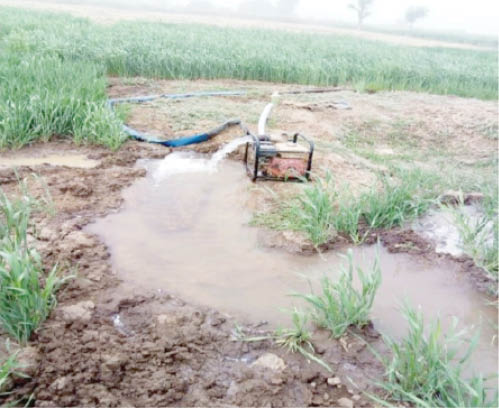Irrigation farmers helpless as fuel, naira not accessible
The scarcity of fuel and naira notes is hitting harder on dry season farmers in Niger State. The farmers told Daily Trust on Sunday that they were finding it difficult to operate because they had no access to naira notes to even engage labourers to help them work on large hectares of farms. One of […]

IMany irrigation farmers need fuel to power thier generators
The scarcity of fuel and naira notes is hitting harder on dry season farmers in Niger State. The farmers told Daily Trust on Sunday that they were finding it difficult to operate because they had no access to naira notes to even engage labourers to help them work on large hectares of farms.
One of the irrigation farmers in Edozhigi district of Gbako Local Government Area, Tauheed Jibrin Dwale said, “Some species of rice are due for harvest while some are yet to ripe. Those whose rice is due for harvest could not access naira notes to engage labourers who want to be paid in cash. So, as I speak with you, some species that are due for harvest are getting spoilt in farms because rodents are also eating them. Due to the vastness of the farms, some of us could not cultivate without engaging labourers; we cannot do it alone, and there is no cash.”
He added that those whose rice was not due for harvest needed money to buy fertiliser and fuel to pump water to their farms to enable the rice grow well.
“We are harvesting sugarcane now but nobody comes to buy. In fact, we have sugarcane in large quantities but it is wasting in farms because our buyers complained that they could not access cash. So the scarcity of naira notes is a serious problem to irrigation farmers.
“We had hoped to recover from the flood disaster during the rainy season, but with this problem of naira notes, we are losing hope. We have been harvesting rice but there are no buyers.
“Fuel scarcity also affects farmers as they can no longer buy fuel to pump water to irrigate their farms,” Dwale said.
He appealed to the Hydropower Producing Area Development Commission (HYPPADEC) to assist the community recover from the flood disasters of the last rainy season, saying it had not extended its interventions to Edozhigi community despite the fact that they were the worst hit.
Adamu Aliyu, a farmer in Katcha Local Government Area of the state, told Daily Trust on Sunday that “the scarcity of naira notes and fuel is dealing a fatal blow on our irrigation farming activities.
“We need to pump water to our farms, buy fertiliser and other necessary inputs that would support our crops to yield well, but we don’t have money at hand to buy, and even if you have money, the price of fuel has continued to increase on a daily basis. But we have no choice because we have gone far in farming this year and we cannot allow it waste.”
He said they had a high hope to record a bumper harvest of rice and other crops from irrigation farming this dry season, calling on the federal government to take a quick action to resolve the challenges of the scarcity of fuel and naira notes.
“If this problem persists it would lead to a waste of effort because we have spent hugely on our farms. And this is the only means of livelihood we have.
“We believe in God but the government should take action and make the naira notes available, as well as ensure that the price of fuel comes down because it can determine the cost of inputs. The fertiliser that was sold to us at N11,000 during the rainy season is now N25,000,” he lamented.
He said the price of farm produce had come down, yet there were no buyers because most sellers would not accept transfer due to their experiences with fake alerts. He said that no matter how cheap a commodity is, they would reject transfer. And you don’t have cash to pay. What do you do?”
Another farmer, Ibrahim Mohammed said, “Some species of rice that are not due for harvest are already dying because we don’t have cash to buy fuel to power generators to pump water. Some people had dug boreholes, from where they pump water to their farms, but there is no cash to buy fuel. And you need to pump water to your farm, at least twice a day because we are already in the heat period. So you have to pump water in the morning and evening.”
